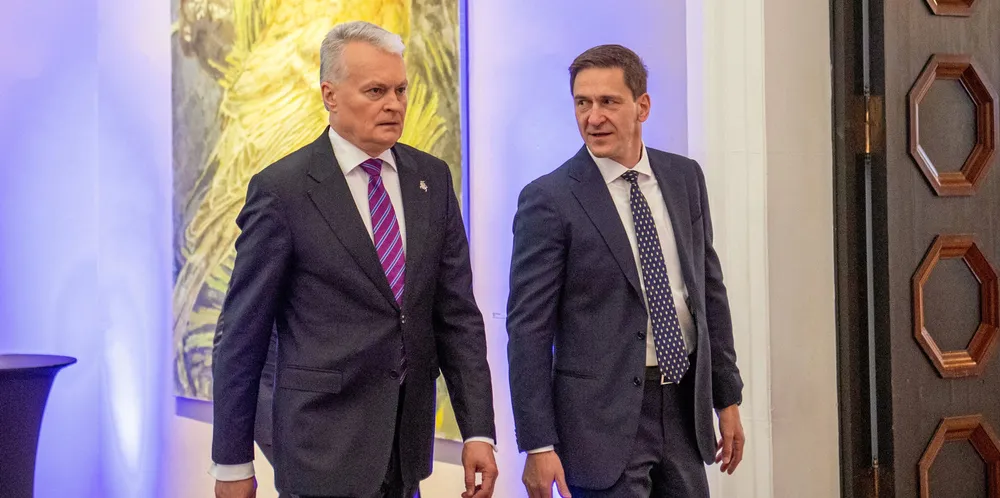Baltic Sea nations turn to Nato and EU to protect offshore infrastructure from Russian threats
Countries prepare declaration at high-level energy security meeting in Vilnius stressing need to build out offshore wind and thwart hybrid and cyber interference

The nations surrounding the Baltic Sea have pledged to align their efforts in replacing fossil fuel imports from Russia with offshore wind energy and protect their marine infrastructure from cyber and physical threats within Nato and the EU.
The countries at a high-level meeting on energy security in the Lithuanian capital of Vilnius – which was also attended by Nato’s assistant secretary general for innovation, hybrid and cyber David Van Weel – prepared a joint declaration to be signed next week in which they say they are fully committed to ensuring the protection and resilience of critical infrastructure in the Baltic Sea to react to growing attempts of hybrid and cyber interference.
“We will work together to increase the security of offshore and underwater infrastructure and deter possible malign activities against them within NATO and the EU,” the declaration states.
Nato's van Weel made clear how cooperation across countries in renewable energy is key.
"The stakes for Nato are high: If allies take diverging directions in adapting to the energy transition, some technologies might be incompatible and our military interoperability can be at risk," he said in Vilnius.
"If we do not plan and secure the supply chains of critical raw materials and renewable energy technologies, we might end up with another energy dependency – this time on China. (…) Nato's energy transition by design is a massive challenge, but it is vital to meet it if we want our Alliance to be greener and stronger.”
"We are also promoting technological innovation, including sea drones, new sensors and the use of AI to better detect any suspicious activity," a Nato official said.
"Allies have established Nato's Maritime Centre for the Security of Critical Undersea Infrastructure within Nato's Maritime Command. We are also working closely with the European Union, through the NATO-EU task force on resilience and critical infrastructure.”
WindEurope CEO Giles Dickson told the same conference that renewables are critical infrastructure which needs to be made secure.
"The wind industry is already helping the military to protect energy infrastructure - and to support national security more broadly," he said.
"By exchanging data, hosting relevant technology and supporting the operation of radar. Nato is doing excellent work here.
"We encourage governments to build physical, cyber and data security into their procurement of energy equipment, including the qualification criteria they apply to who can build wind farms.”
Lithuanian President Gitanas Nausėda told the conference in Vilnius that his country in the wake of “Russia’s full-scale war of aggression against Ukraine” had demonstrated how to completely end the import of fossil fuels and electricity from Russia and “will never look back.”
“There is no other option but to disentangle them from Russia completely,” he said, also warning other countries to replace piped Russian gas with LNG imports from the country.
Instead, renewables, energy efficiency and storage, as well as interconnectivity are the way forward, he stressed.
The two Baltic Sea wind farms will help the country meet 100% of its power consumption with renewable energy by 2030, Nausėda stressed.
Lithuanian energy minister Dainius Kreivys at the same event said “it was neither cheap nor easy” to stop Russian gas and electricity imports, but “doable” and necessary for his country’s energy independence.
Lithuania is a former Soviet state which has joined Nato and the EU.
Cross-regional coordination and EU involvement “must ensure the full resilience and protection of our critical energy infrastructure against cyber and physical threats,” Kreivys stressed.
“I’m honoured that NATO Assistant Secretary David van Weel has accepted the invitation to join us today. There is so much we need to do to protect our energy infrastructure and ensure energy security, especially now when there is a war just behind our doors,” he said, adding that since the war against Ukraine started, there has been a significant increase in cyber-attacks on Lithuania’s energy infrastructure.
“A coordinated response by like-minded countries is essential, especially because most of these threats cross our national borders. It goes without saying that the protection of energy infrastructure becomes even more important when you consider our plans to develop offshore wind farms and other strategic infrastructure in the Baltic Sea.”
Belgium’s energy minister Tinne van der Straeten stressed how cross-border infrastructure is “a matter of geopolitical importance” and said she will bring in the issues discussed in Vilnius to the next meeting of EU energy ministers in Brussels next week. Belgium currently holds the EU presidency.